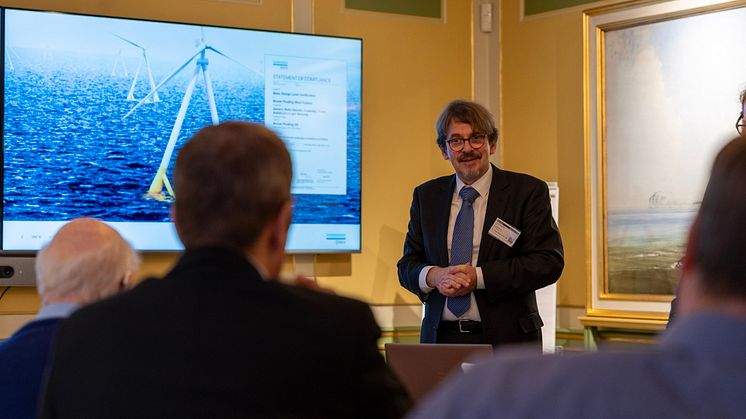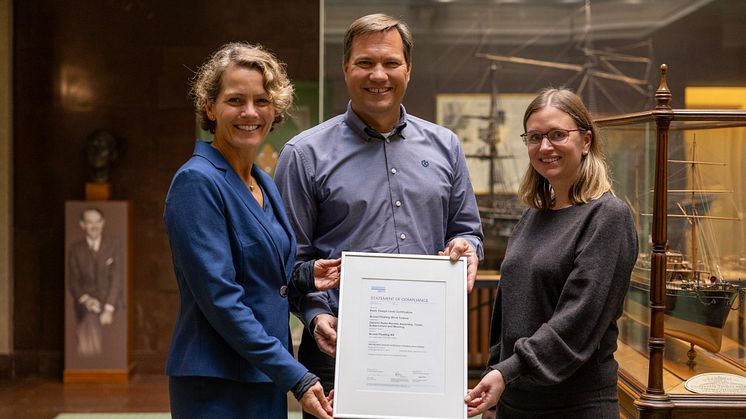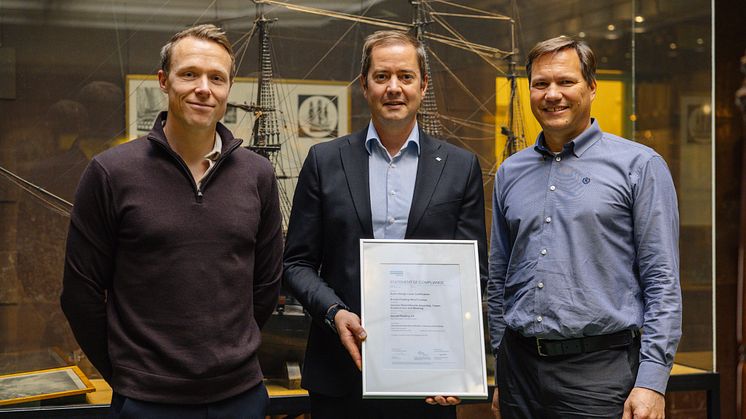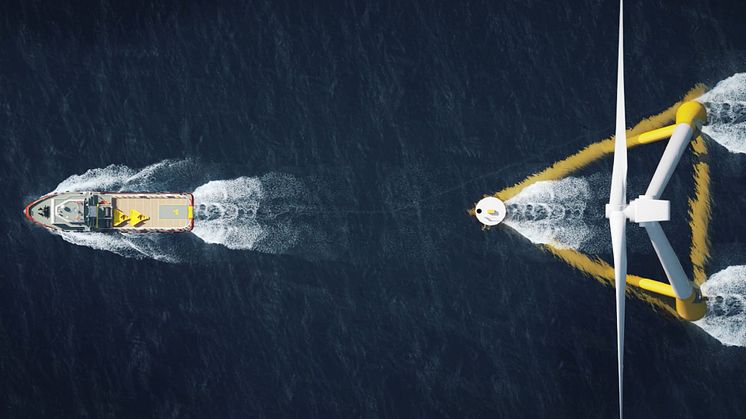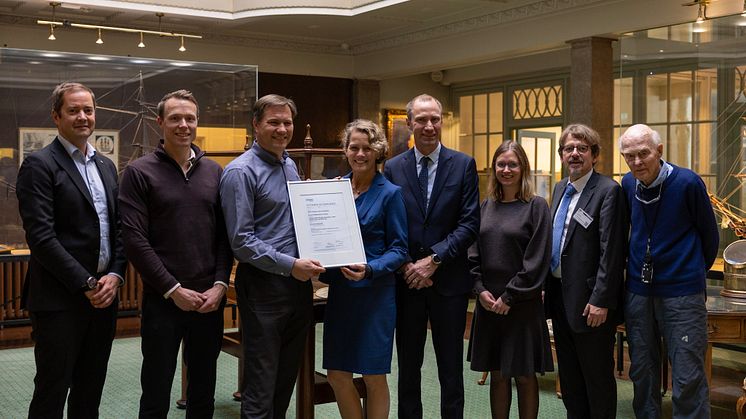
Press release -
BRUNEL Floating Foundation Completes DNV Basic Design Certification
Fred. Olsen 1848 is pleased to announce that BRUNEL Floating Foundation, a leading initiative in the floating offshore wind market, has completed its comprehensive basic design phase according to DNV’s recently updated certification scheme for floating wind, DNV-SE-0422, and was subsequently awarded a DNV Basic Design Certification as one of few foundation designs in the industry.
The DNV certificate symbolizes trust in our floating offshore wind technology representing safety, quality, and compliance in the design. With the finalization of the Basic Design, BRUNEL Floating Foundation has taken a substantial leap towards a final site-specific design as part of project certification.
Sille Grjotheim, Global Segment Director for Floating Offshore Wind at DNV, says:
“Floating offshore wind capacity is projected to 217 GW by 2050, as per DNV's 2024 Energy Transition Outlook. To make this happen, the qualification of new technology like BRUNEL, based on state-of-the-art methods linked to leading industry standards, is key in bringing early confidence to stakeholders in the market. “
Anne Lene Haukanes Hopstad, DNV’s Project Manager, concludes:
“Achieving the Statement of Compliance for Basic Design is an important step for BRUNEL. This certification module has been a follow up from the concept certification performed in 2022 and has shown that Brunel has matured. We are looking forward to continued certification of Brunel in the next development phases. As designs and technologies develop, ensuring safety is paramount for floating offshore wind projects in securing project finance and demonstrating operational applications.”
Completing the basic design phase and receiving the DNV certification signifies the achievement of numerous significant milestones:
- Acquired acceptance for our comprehensive design methodologies and development for primary steel design, secondary steel, mooring, manufacturing, assembly and integration, logistics, transportation, and installation, as well as operations and maintenance philosophies.
- By securing acceptance for these methodologies, BRUNEL is now positioned for execution of site-specific detail design endeavors. As critical items have already been reviewed, the Basic Design phase considerably eases the later Projects certification process, as the subsequent detailed design builds upon an approved Basic Design
- Cutting-edge analysis workflow for primary steel design, and documentation of an extensive scope of work of fully coupled analysis of the complete system including floating foundation, turbine, control system, moorings, and environment.
Additionally, the completion is a symbol of the project’s progressing journey toward commercialization.
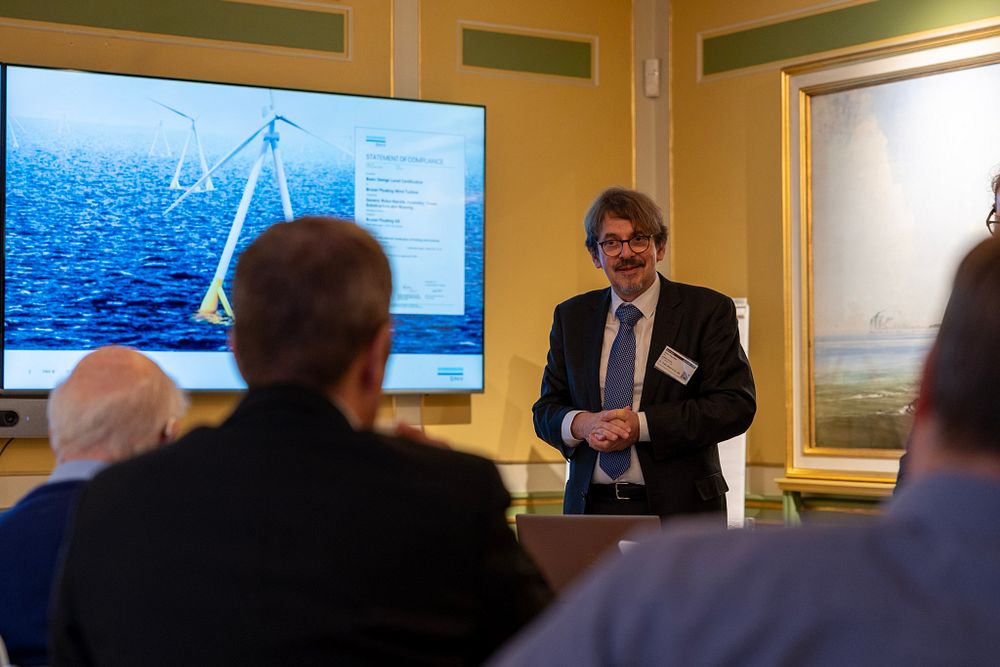
Kimon Argyriadis, Director Floating Wind Energy, DNV.
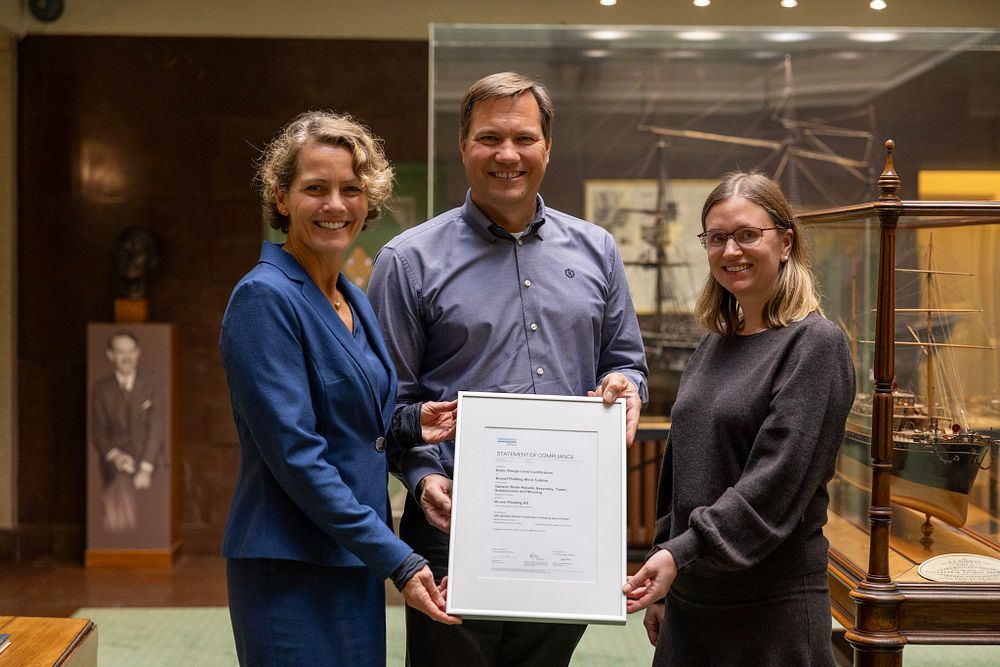
Sille Grjotheim, Global Segment Director Floating Offshore Wind, DNV. Geir Grimsrud. CTO, Fred. Olsen 1848. Anne Lene Haukanes Hopstad, Project Manager, DNV.
Geir Grimsrud, Chief Technical Officer of Fred. Olsen 1848, has commented:
“Through thorough design methodologies and collaboration, we've attained a pivotal moment in our journey. Achieving DNV certification not only marks the culmination of our basic design phase but also underscores our commitment to quality in meeting regulatory standards and project requirements”
The BRUNEL design is characterized by flexibility in secondary steel and outfitting concepts for installation and hook-up procedures offshore to fulfill the needs set forth by legislative bodies and project developers. Fred. Olsen 1848 has close interface collaboration with tubular manufacturers, turret specialists, and high-voltage swivel developers, underscoring our dedication to project integration and optimization.
Throughout the design process, we have collaborated with industry experts who has leveraged their extensive expertise in the energy sector. Ramboll has been the main contractor working as an independent engineering consultant for BRUNEL Floating Foundation and has been responsible for performing the engineering of the basic design certification. Seasystems has been the provider of mooring- and turret technologies alongside MOOG Focal providing high-voltage swivels, both of which have played a vital role in the developments. 7Waves has contributed with expertise on the primary steel design.
Dr. Denis Matha, Ramboll’s Global Head of Floating Wind, has commented:
"We are pleased that FO1848 has selected Ramboll as an independent engineering consultant to be part of this journey and that we have been able to provide key engineering services that contributed to the completion of the project. It also marks a milestone for Ramboll, as this project is among the first to successfully pass through the novel DNV Basic Design Certification scheme with DNV, and for Ramboll, it marks the first project successfully applying our latest advanced Detailed Design methodology based on the GIS."
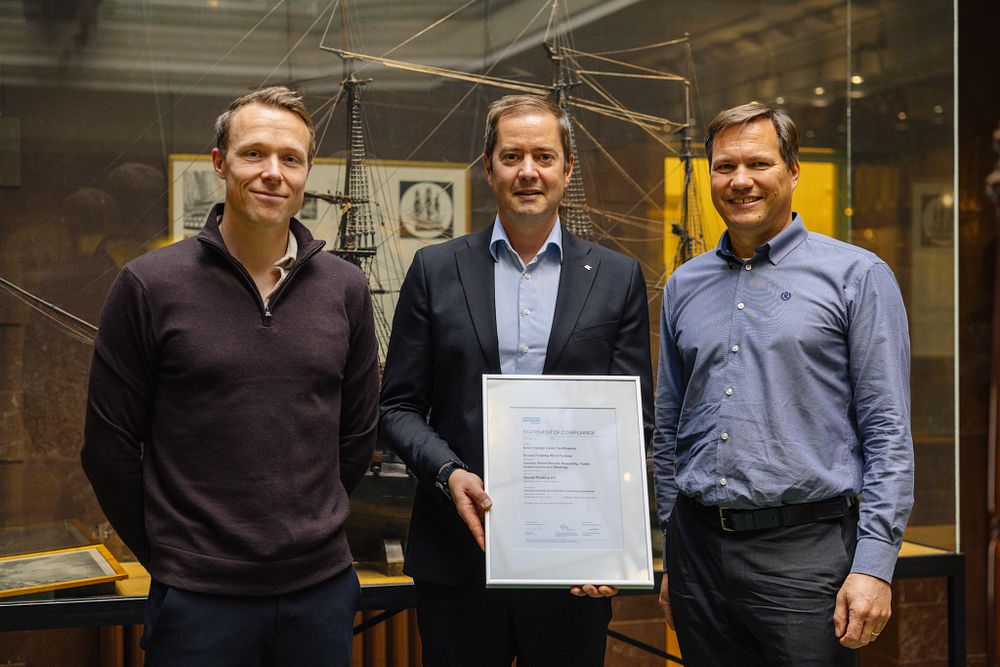
Andreas Buvarp Aardal, Principal Engineer, Per Arvid Holth, CEO & Geir Grimsrud, CTO, Fred. Olsen 1848.
Key Features of BRUNEL Floating Foundation:
- The dual towers with a forward-leaning-angle can optimize rotor tilt angle for increased annual energy production and better utilization of the structural capacity in the towers.
- Semi-submersible structure designed for north-sea conditions.
- BRUNEL is designed to comply with the global existing fabrication capacity of offshore wind towers and monopiles offering great flexibility in the supply chain.
- The BRUNEL floating foundation features a single-point mooring through a turret. The weathevaning function allows for a passive ballast system and a structure that continuously optimizes its position towards the wind thrust force.
Related links
Topics
Categories
Fred. Olsen 1848 is an innovation and technology company that focuses on the development and commercialization of innovative technologies related to renewable energy.
We are a determined and multidisciplinary team with a broad variety of industry experience within the field of renewables, all working towards our goal to make sustainable energy more widely available to help combat climate change.
Innovation and curiosity are our DNA, and our ideas are based on consistent experience and knowledge built up over 175 years of identifying and solving challenges, from when the Fred. Olsen ship-owning enterprise commenced in 1848.
Fred. Olsen 1848 is a part of the ecosystem of Fred. Olsen-related companies within renewable energy. The main technologies of Fred. Olsen 1848 are aimed at solving some of the key industry challenges within emerging renewable energies. For more information, see: www.fredolsen1848.com.

